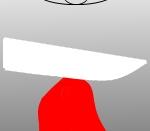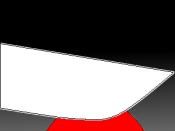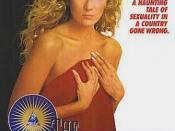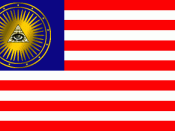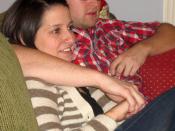ENGLISH ITERATURE ESSAY Chloe Reynolds "ÃÂThe Handmaid's Tale' written by Margaret Atwood is an extreme dystopic vision of the oppression of women, their rights and feminist values. Atwood describes a theocracy in which women are "ÃÂwalking wombs' intended for reproduction only. In Gilead, the arbitrary in which the tale is set, women are denied their identities and their own personal freedom. To overcome this dehumanisation, the feminist icons in the story such as Offred, the lead character, resort to reminiscing about the pasts as an escape route from this totalitarian regime.
Atwood heightens the dystopic effects of her novel through allusion. Allusion legitimises the worst aspects of this society using the Rachel and Bilhah story from Genesis 30 that ultimately perverts the true intent of Rachel's actions. In this story, Rachel uses Bilhah, her maid, as a surrogate mother because she is unable to produce children for her husband Jacob and, hence, uses a handmaiden.
The ironic thing is that all biblical allusions are selected in order to underwrite patriarchal interest. Irony is a very important tool is Atwood's commentary. The way the authorities have tried to create a utopia has, in-turn, created a dystopia. The vision of an ideal or model world shrouded in harmony has been clouded by an unrealistic, unimaginable world that could only be called a Dystopia. Women are the centre of this dystopia, without them the Gileadian society would be non existent, yet women are treated as institutionalised sex victims with no freedom to choose their own lovers or even keep the children they bear. Children beared by the handmaids go straight to the commander's wives as if they are nothing more than a business transaction, even prizes, " The commander's wife looks down at the baby as if it is a bouquet of flowers, something she's won, a tribute."� P136 The society of Gilead and the role of the handmaid is based around sex and pregnancy as social obligations, not personal choices. Women are still treated as objects, degraded, controlled and undermined by a distorted theocracy. "We are two-legged wombs, that's all: sacred vessels, ambulatory chalices."� P146 Offred refuses to lose her perspective and continually reminisces about her pat to help maintain her sanity. This is the "ÃÂreconstruction' technique that Atwood uses in her commentary. It humanises Offred, making her appear as if she does actually have thoughts, feelings and memories, she has not yet been broken by society. Offred does not openly disagree with what is going on around her, she discreetly sits on the fence and does what is necessary, nothing more, nothing less. " I want everything back, the way it was. But there is no point to is, this wanting."� P132 Offred accepts the fact hat there is nothing she can do to change the situation that she is in so she lives with it. Moira, on the other hand, is the complete opposite. She is Offred's best friend and a pillar of feminism. Moira had a bad reputation with the aunts because she still had a taste for freedom and doesn't hesitate to influence other handmaids. She was openly rebellious, a "ÃÂloose' woman and this bestowed power on her. "Moira had power now, she'd been set loose, she'd set herself loose. She was now a loose woman. I think we found this frightening. Moira was like an elevator with open sides. She made us dizzy"æ Moira was our fantasy"æ In the light of Moira, the aunts were less fearsome and more absurd."� P143 Moira was like a goddess to the other handmaids, someone they could cling to, someone they could rely on. Contrarily, Janine was on the other side of the compliancy scale. She had completely lost her identity and is referred to as "a puppy that had been kicked too often, by too many people."� P139 She is a weak and pitiful character who cannot be trusted. Where Moira is strong and genuine, Janine is snivelling and transparent. She will do anything for a moment of approbation.
These three central characters, Offred, Moira and Janine show how different women conformed to the regime that they had to succumb to. Offred reminisces about her past for comfort and to maintain her sanity. Moira unguardedly demonstrates her disrespect for authority and inturn makes herself a role model. Lastly, Janine willingly kisses the feet of her masters and does what she's told without interrogation. These women were denied the right to question the authorities and their intentions. Women were bound to "ÃÂconjugal obligations' due to the patriarchal values and beliefs that were central to regime.
Gilead actually did do some amiable things for women in society despite the negative aspects that were mostly prevalent. Females had reclaimed the night - it was safe for them to walk the streets. They were given freedom from obscenities; however, this seems ironic considering the ceremonies the handmaids had to undergo. Handmaids are all equal and vital to the growth and survival of Gilead; they became revered. With some of these positive aspects there were also negative, yet it makes it difficult to decided from an outsiders point of view whether they were better off. There was barely any crime, no documented poverty and no competition between women for love, marriage. However, there is no love, no choice and no freedom. These things are human nature and to take them away from not only women but also men for the purpose of winning a war seems incredibly inhumane. The authorities of Gilead completely ruled out love as nature's norm and considered it something pushed by the magazines of Pre-Gilead.
Generally, a theocracy is a government that bases their political laws on a religion. Gilead's laws are based on Christianity but they twisted the religion around so much that that it is almost used as a scapegoat. The oppression of women and dystopic vision of their rights and values at the "ÃÂhands' of a distorted religion makes our 20th century minds cringe at the freedom and choice that they were denied. In the present, issues such as sex, love, marriage, childbearing are taken so much fro granted that it is unimaginable how people such as ourselves would react in this sort of situation. Gileadian authorities were trying to build up a society that was unbreakable by arranging loveless marriages and shredding deformed babies, not to mention countless other things. In the process they denied human spirit, human love and human emotion. They tore down feminist values and rights and made women susceptible to institutionalised rape for reproduction. Patriarchal values and beliefs were thrown out of proportion making it a man's world, fulfilling men, demoralising women.
